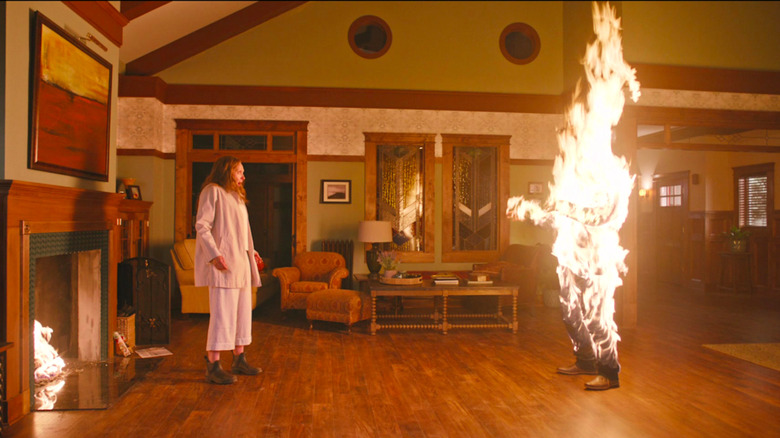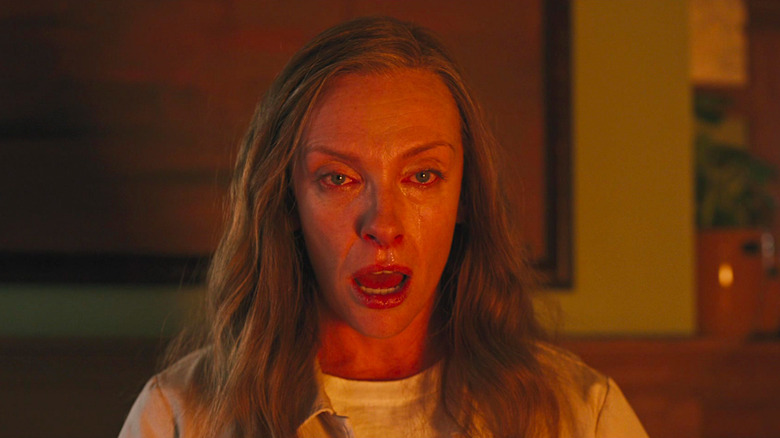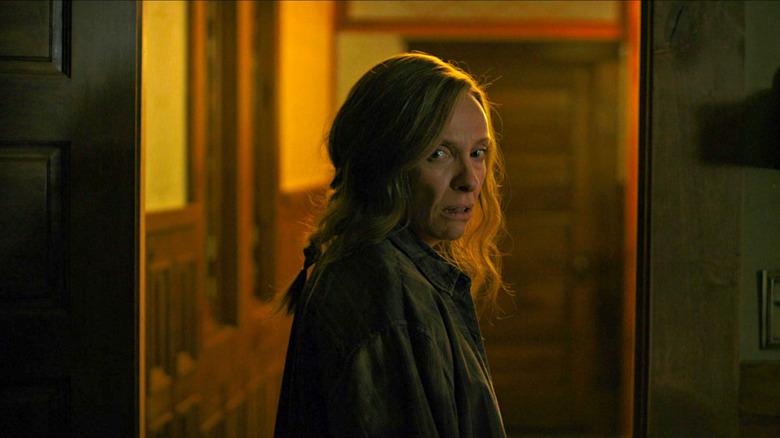Toni Collette's Hereditary High Point Didn't Need A Rehearsal
There is absolutely no doubt that Toni Collette's Annie Graham goes through some serious s*** in Ari Aster's horror drama "Hereditary." To start things off, there's the death of her mom, a woman that Annie feels fairly ambivalent about, even in death. But as she struggles to come to terms with her grief over her mother's passing, another tragedy strikes that absolutely sends her over the edge. Aster's two feature films — "Hereditary" and "Midsommar" — love to pile on the tragedy just when it seems like a character can't take anything more (in "Midsommar," the tragic death of Dani's parents and sister is followed by her indoctrination into a literal sacrificial — some might say murderous — cult). But when Charlie, Annie's young daughter, is accidentally beheaded only 30 minutes into the runtime of "Hereditary" by an ill-placed telephone pole during a very tense car ride in which Annie's son is driving, you really start to ask yourself just what is this movie that you are watching?
The remainder of "Hereditary" is Annie's singular journey through her grief, both over her mother and her daughter, and Collette does an impeccable job of conveying what any practical person would consider a necessary complete and total unraveling over all she has had to endure. Because of Collette's steady performance throughout the entire movie, Annie's seeming descent into madness and obsession feels organically unhinged. So much so that when one of the film's final scenes involving the spontaneous combustion of yet another of Annie's beloved family members, Collette seems right at home in conveying the pain, horror, and grief she experiences in this moment. It's a humbling scene — I, admittedly, teared up a bit at this very moment when I first saw the film — and Collette's acting chops become all the more impressive when you realize it only took one take to get this scene right.
A singular shift from fear to possession
Annie, after finally understanding her son is in danger of being possessed by the demon Paimon, begs her husband Steve to throw Charlie's old sketchbook — the life source of Paimon — into the fireplace. She knows doing so will kill her, but she's desperate to save her son. Steve listens patiently to Annie, but just when it seems like he's going to follow through with her wishes, he hesitates, telling Annie that she needs psychological help. Panicking, Annie grabs the sketchbook from Steve's hands and throws it into the fire herself, but instead of her body being engulfed in flames, it's her husband's. Annie looks on in horror as Steve burns alive in front of her, but as the camera settles on her petrified face, a line of light passes over her and her expression immediately switches from fear to an unsettling calm. The spirit of Paimon now possesses her.
In an article for the Los Angeles Times, Collette explained how this shot got completed in just a single take. She says, "It was the last shot, it was like two in the morning, and we did it once." Her and Aster had not spoken immediately beforehand about what he expected from her in that moment from shock to possession, but they previously spent a lot of time discussing the film and her role in it. These discussions were obviously enough for Collette to know what to do in this key scene, and the results are absolutely chilling.
The unlikely freedom of possession
Collette goes on to explain to the Los Angeles Times how Annie's eventual understanding of who her mother really was can be seen as freeing, even if it's also terrifying. "Her whole life has been orchestrated and manipulated. This woman has had no sense of freedom and she has not understood it until now," she says. "In a way, I imagine it's somewhat of a relief to understand what has been going on."
Even though we know that Annie's face in this scene is meant to represent her possession by Paimon, we can also read it as a release. Like Collette says, she finally understands her whole life, and in this moment, even though she is literally possessed, there is a part of her that is set free, as well. And thanks to Collette's magnificent acting chops, we understand all of this just through one single expression that only needed one take to get exactly right.


